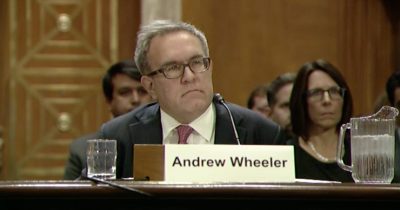Europe Says ‘No Safe Level’ of Brain-Damaging Pesticide Trump EPA Refused to Ban
EU Food Safety Authority Poised To Ban Chlorpyrifos Over Risks to Children

European food safety regulators have found there is no safe level of exposure for a brain-damaging pesticide President Trump’s Environmental Protection Agency recently refused to ban.
The European Food Safety Authority said today that chlorpyrifos, widely used on fruits and vegetables in the U.S. and worldwide, “does not meet the criteria” for approval of its use in the 28-nation European Union, citing concerns over the pesticide’s risks to children. The announcement indicates that the EU is likely to ban chlorpyrifos, whose main manufacturer is Dow Chemical Company, when its license expires in January.
“The EU is doing what the science demands: putting public health ahead of the narrow interests of the pesticide industry,” said EWG President Ken Cook. “Tragically for American kids and their parents, the Trump administration is kowtowing to chemical agribusiness and allowing a dangerous pesticide to be sprayed on foods children eat every day.”
A robust body of scientific evidence shows that even small doses of chlorpyrifos can damage parts of the brain that control language, memory, behavior and emotion. Multiple independent studies have found that exposure to chlorpyrifos impairs children’s IQs.
EPA scientists assessed those studies and concluded that the levels of the pesticide currently found on food and in drinking water are unsafe. The scientists estimate that typical exposures for babies are five times greater than the agency’s proposed “safe” intake, and 11 to 15 times higher for toddlers and older children. A typical exposure for a pregnant woman is five times higher than it ought to be to protect her developing fetus.
The most recent data from the U.S. Geological Survey show an estimated 5 million pounds of the weedkiller was sprayed on U.S. cropland in 2016.
The EPA was poised to ban chlorpyrifos early in 2017. But after the 2016 election, Dow launched an aggressive campaign to block that decision. Dow donated $1 million to Trump’s inauguration festivities, and its CEO met privately with then-EPA Administrator Scott Pruitt. Soon after, Pruitt ignored his agency’s own scientists and aborted the scheduled ban.
Last August, the Ninth Circuit Court of Appeals ruled that Pruitt’s decision violated federal law and ordered the EPA to ban chlorpyrifos within 60 days. But Pruitt’s replacement, Andrew Wheeler, fought the ruling and refused to obey the court’s order.
The Justice Department filed a petition on behalf of the agency, calling on the court to overturn its earlier ruling and leave chlorpyrifos legal. In April, the court ordered Wheeler and the EPA to make a decision within 90 days on whether to ban the pesticide.
Last month, with the court deadline looming, Wheeler announced his decision to allow chlorpyrifos to continue to be used on conventionally grown food crops, like peaches, cherries, apples, oranges and corn.
*
Note to readers: please click the share buttons above or below. Forward this article to your email lists. Crosspost on your blog site, internet forums. etc.

